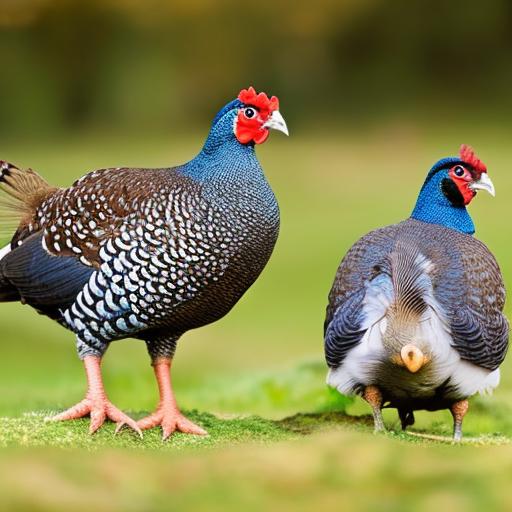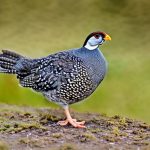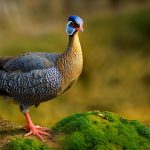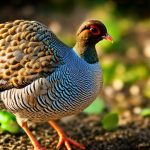Guinea fowl, also known as pintades, are a type of poultry that are native to Africa. They are closely related to other game birds such as pheasants and partridges. Guinea fowl are known for their distinctive appearance, with speckled feathers and a helmet-like crest on their heads. They are also known for their loud and distinctive calls, which can be heard from a distance. Guinea fowl are popular for their meat, eggs, and pest control abilities. They are often kept on farms and homesteads for their practical benefits and unique characteristics.
Guinea fowl are hardy birds that are well-suited to a variety of climates. They are known for their ability to forage for food and fend for themselves, making them relatively low-maintenance compared to other types of poultry. Guinea fowl are also known for their keen sense of alertness and their ability to act as natural alarm systems, alerting other birds and animals to potential threats. They are social birds that thrive in small flocks, and they are known for their strong flock instincts. Overall, guinea fowl are fascinating and useful birds that can make a valuable addition to a farm or homestead.
Key Takeaways
- Guinea fowl are hardy, low-maintenance birds that are known for their pest control abilities and flavorful meat.
- When housing guinea fowl, provide a secure shelter with roosting bars and nesting boxes, as well as access to a spacious outdoor area.
- Guinea fowl should be fed a balanced diet of commercial poultry feed, supplemented with insects, seeds, and greens for optimal health and nutrition.
- Regular health checks, vaccinations, and access to a veterinarian experienced with poultry are essential for maintaining the well-being of guinea fowl.
- Breeding guinea fowl requires careful selection of breeding stock, proper nesting areas, and protection from predators to ensure successful reproduction.
Housing and Shelter for Guinea Fowl
When it comes to housing and shelter for guinea fowl, there are a few key considerations to keep in mind. First and foremost, it’s important to provide guinea fowl with a secure and predator-proof coop or housing structure. Guinea fowl are vulnerable to predators such as foxes, raccoons, and birds of prey, so it’s essential to ensure that their housing is well-protected. Additionally, guinea fowl require ample space to roam and forage, so their housing should be spacious and well-ventilated.
Guinea fowl also benefit from access to outdoor space, so providing them with a secure outdoor run or enclosure is important. This allows them to exhibit natural behaviors such as dust bathing and foraging, while still keeping them safe from predators. When it comes to roosting, guinea fowl prefer to perch off the ground at night, so providing them with elevated roosting bars or platforms within their coop is ideal. Overall, the key to successful housing for guinea fowl is to provide them with a secure, spacious, and well-ventilated environment that meets their natural behavioral needs.
Feeding and Nutrition for Guinea Fowl
Feeding and nutrition are important aspects of caring for guinea fowl. Guinea fowl are omnivorous birds that have a varied diet consisting of seeds, insects, plants, and small animals. In a domestic setting, guinea fowl can be fed a commercial poultry feed that is specifically formulated for game birds. This feed should contain a balanced mix of protein, vitamins, and minerals to support the health and wellbeing of the birds.
In addition to commercial feed, guinea fowl can also benefit from access to fresh greens, fruits, and vegetables. They are avid foragers and enjoy pecking at the ground in search of insects and other small creatures. Providing them with access to a diverse range of foods can help keep them healthy and engaged. It’s also important to ensure that guinea fowl have access to clean, fresh water at all times. Proper hydration is essential for their overall health and wellbeing. By providing a balanced diet that meets their nutritional needs, guinea fowl can thrive and flourish in a domestic setting.
Health and Veterinary Care for Guinea Fowl
Maintaining the health and wellbeing of guinea fowl is essential for their long-term care. Like all poultry, guinea fowl are susceptible to a range of health issues such as parasites, respiratory infections, and injuries. Regular observation of the birds is important in order to detect any signs of illness or distress early on. It’s also important to provide guinea fowl with a clean and sanitary living environment in order to minimize the risk of disease.
In the event that a guinea fowl does become ill or injured, it’s important to seek veterinary care from a professional who has experience with poultry. A knowledgeable veterinarian can provide guidance on treatment options and preventative care measures. Additionally, it’s important to stay up-to-date on vaccinations and preventative treatments in order to protect the birds from common diseases and parasites. By prioritizing the health and veterinary care of guinea fowl, owners can help ensure that their birds lead healthy and fulfilling lives.
Breeding and Reproduction of Guinea Fowl
Breeding and reproduction are important considerations for those who keep guinea fowl. Guinea fowl are seasonal breeders, typically mating in the spring and early summer months. In order to encourage successful breeding, it’s important to provide guinea fowl with a suitable nesting area that is secluded and secure. This can be achieved by providing nesting boxes or secluded areas within their housing structure.
Once mating has occurred, female guinea fowl will lay clutches of eggs over a period of several weeks. It’s important to collect these eggs regularly in order to prevent them from being damaged or eaten by predators. If breeding is desired, the eggs can be placed in an incubator or left with a broody hen for hatching. It’s important to note that guinea fowl can be protective of their nests and may exhibit aggressive behavior towards intruders during the breeding season.
When raising guinea fowl chicks, it’s important to provide them with a warm and secure brooding area until they are old enough to join the adult flock. By understanding the breeding and reproductive behaviors of guinea fowl, owners can help support successful breeding efforts and the healthy development of young chicks.
Predation and Protection for Guinea Fowl
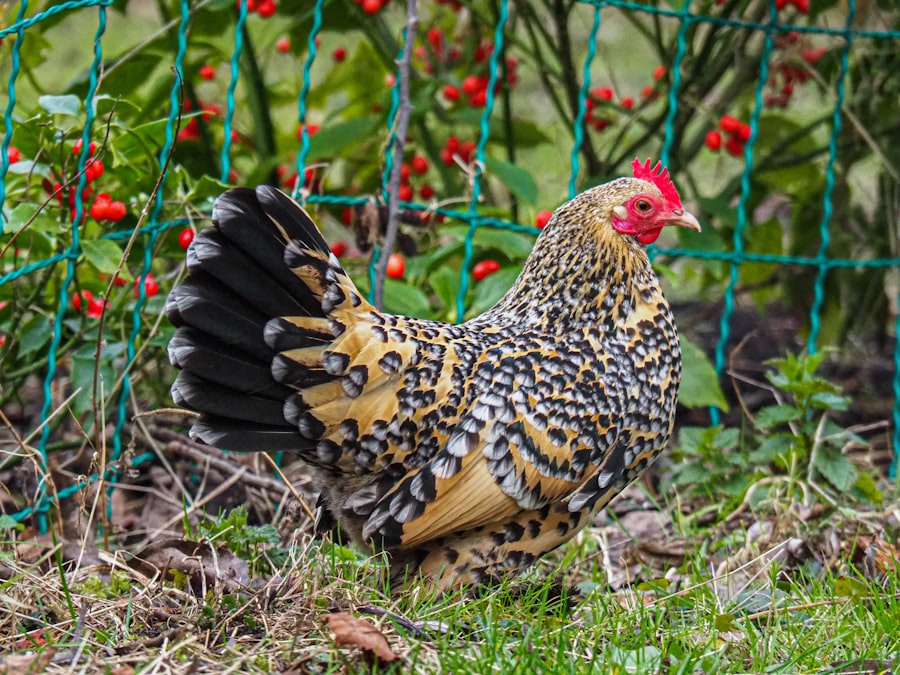
Predation is a significant concern when it comes to keeping guinea fowl. These birds are vulnerable to predators such as foxes, raccoons, dogs, and birds of prey. In order to protect guinea fowl from predation, it’s important to implement effective predator control measures. This can include securing their housing with sturdy fencing and locks, as well as providing them with a secure outdoor run or enclosure.
Additionally, it’s important to be mindful of potential threats from above, such as birds of prey. Providing overhead cover within their outdoor space can help protect them from aerial predators. It’s also important to be vigilant about potential threats and take proactive measures to deter predators from the area where the guinea fowl are kept.
In some cases, guard animals such as dogs or geese can be used to help protect guinea fowl from predators. These animals can help deter potential threats and provide an added layer of security for the flock. By implementing effective predation and protection measures, owners can help ensure the safety and wellbeing of their guinea fowl.
Tips for Keeping Guinea Fowl in the UK
For those considering keeping guinea fowl in the UK, there are several tips that can help ensure success. Firstly, it’s important to check local regulations and zoning laws regarding the keeping of poultry in your area. Some areas may have restrictions on the number of birds that can be kept or specific requirements for housing and care.
When it comes to housing guinea fowl in the UK, it’s important to provide them with a sheltered environment that protects them from the elements. The UK climate can be variable, so ensuring that their housing is well-insulated and protected from wind and rain is essential.
In terms of feeding, guinea fowl in the UK can benefit from access to a varied diet that includes supplemental greens during the winter months when natural forage may be limited. Additionally, providing access to grit can help support their digestive health.
Finally, it’s important to be mindful of potential threats from predators such as foxes and birds of prey in the UK. Implementing effective predator control measures is essential for protecting guinea fowl from harm.
In conclusion, keeping guinea fowl in the UK can be a rewarding experience when proper care and consideration are given to their housing, feeding, health, breeding, protection from predation, and overall wellbeing. By understanding their unique needs and behaviors, owners can help ensure that their guinea fowl thrive in a domestic setting.
If you’re interested in keeping guinea fowl in the UK, you may also want to learn about the importance of providing a suitable coop for turkeys. Check out this informative article on poultrywizard.com to discover the essentials of creating a safe and comfortable living space for your turkeys. Understanding the housing needs of different poultry species can help ensure the well-being and productivity of your flock.
FAQs
What are guinea fowl?
Guinea fowl are a type of bird native to Africa. They are known for their distinctive spotted feathers and loud, chattering calls.
What do guinea fowl eat?
Guinea fowl are omnivores and eat a variety of foods including insects, seeds, and small fruits. They are also known to forage for food on the ground.
Are guinea fowl good for pest control?
Yes, guinea fowl are excellent for controlling pests such as ticks, flies, and other insects. They are often kept on farms and in gardens for this purpose.
How do you keep guinea fowl in the UK?
To keep guinea fowl in the UK, it is important to provide them with a secure coop or shelter to protect them from predators. They also need access to a large outdoor area for foraging and exercise.
Do guinea fowl require any special care in the UK?
Guinea fowl are relatively low-maintenance birds, but they do require access to fresh water, a balanced diet, and protection from extreme weather conditions.
Can guinea fowl be kept with other poultry?
Guinea fowl can be kept with other poultry such as chickens and ducks, but it is important to introduce them carefully and monitor their interactions to prevent any aggression.
Do guinea fowl need to be vaccinated in the UK?
Guinea fowl do not require vaccinations in the UK, but it is important to keep their living area clean and provide them with a healthy diet to prevent disease.
Meet Walter, the feathered-friend fanatic of Florida! Nestled in the sunshine state, Walter struts through life with his feathered companions, clucking his way to happiness. With a coop that’s fancier than a five-star hotel, he’s the Don Juan of the chicken world. When he’s not teaching his hens to do the cha-cha, you’ll find him in a heated debate with his prized rooster, Sir Clucks-a-Lot. Walter’s poultry passion is no yolk; he’s the sunny-side-up guy you never knew you needed in your flock of friends!

